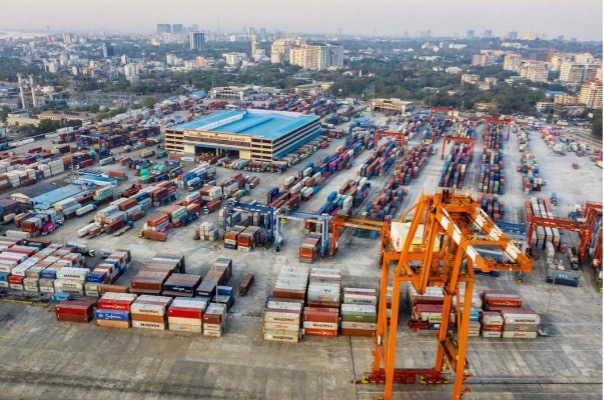12th March 2021
In order to give you all a balanced view of the situation, I have a piece from the Global New Light of Myanmar (the State-owned paper) that gives a different perspective.
Chickpea growers in Pwintbyu Township, Magway Region are expecting a good price in the coming harvest season amid low yield this year.
On 5 February, the prices of chickpeas ranged between US$1,365 and $1,385 per tonne, Bayintnaung market’s data showed.
At present, the domestic bean market is positively related to the law of supply and demand. The black bean price depends on the buyers and sellers. There is no official set price, the traders stressed.
“The prices usually fluctuate depending on supply and demand. When the peas are loaded on the ship, the prices climb up. The market is now slowing down due to transport problem and transaction difficulties,” said a trader from Mandalay shared his opinion.
Source Global New Light of Myanmar 12th March 2021.
As with every piece in the Global New Times of Myanmar, it pays to read between the lines as it inadvertently gives the game away. The phrase “transport problem and transaction difficulties” is the key. Everyone else knows that the rail workers are on strike, the CDM is stopping haulage drivers working and the banking system is in chaos. So of course, nothing is working, but the GNLM can’t say that.
Meanwhile, back in the real world, exports have almost ceased.
Striking truck drivers, bureaucrats and bank workers have brought international trade through Yangon’s ports to a standstill, with exports estimated to be down as much as 90 percent since February 1.
When he bought millions of dollars of pulses back in January, Madhu never imagined they would still be sitting in a Yangon warehouse two months later.
But the February 1 military takeover has wreaked havoc with Myanmar’s international trade, largely due to the Civil Disobedience Movement that has seen tens of thousands of workers – if not more – in the public and private sectors go on strike until democracy is restored.
Truck drivers, Customs agents, port workers and staff from various government and semi-government agencies that issue documents needed to import and export goods have all stopped working, bringing sea-bound trade to a halt.
The effect has been most keenly felt in Yangon, which handles nearly all of Myanmar’s sea-bound trade and close to 70 percent of total recorded trade flows.
“No one is willing to even load the cargo,” Madhu told Frontier in late February. “Our local suppliers aren’t loading and there’s no container trucks to take them to the port.”
Loading cargo is only the first hurdle, though. Workers at the Union of Myanmar Federation of Chambers of Commerce and Industry are on strike, which means exporters can’t get a certificate of origin. The closure of private banks due to rank-and-file workers joining CDM has made it difficult to send or receive payments. Those like Madhu who are exporting agricultural products also need a phytosanitary certificate from the Ministry of Agriculture, Irrigation and Livestock, but the staff who issue them are refusing to work, too.
“Everyone is facing the same problem and there’s no one to turn to for help,” he said. “We don’t know when the resolution will come. If you ask me, are we worried, of course we are … I’ve never seen anything like it.”

Customs clearance agents and officials from the Myanmar Container Trucks Association told Frontier earlier this month that export volumes through Yangon’s ports were down as much as 90pc, while imports coming through Customs were down about 80pc.
The first problems began to emerge on February 8, when staff at private banks joined the CDM en masse, forcing the closure of virtually all branches. This brought international money transfers to a halt, and also made it difficult to pay Customs duties on imports.
Four days later, many container truck drivers joined the movement, putting the brakes on the movement of goods destined for export and also imported items that had been unloaded at the port.
Almost all of the 2,800 trucks under the MCTA joined the strike, accounting for about 70pc of all container vehicles.
One senior official from a Customs clearance company said that almost the only container trucks that have been running are those owned by the Tatmadaw-linked company Myanma Economic Holdings Limited, and prices had risen from K10,000 to K80,000 a trip.
“At the moment you can only hire trucks from MEHL and the drivers demand exorbitant prices. As a result, a lot of goods are piling up at the ports, unable to move,” he said.
From February 12, when truck drivers joined CDM, to March 7, data from marine tracking websites shows that 24 vessels left Yangon Port without any cargo, while nine left partially laden and just five left fully loaded.
It’s a similar story downriver at Thilawa, where 28 vessels left without any cargo over the same period, two left partially laden and two left fully loaded.
Source Frontier 12th March 2021.
The question is, of course, who is giving a better news service, Global New Light of Myanmar or Frontier? And which one is the military trying to close down? What is indisputable is that day by day, the economy becomes ever more turgid as it slips into paralysis.
Regular followers will have read warnings about the possibility of EAOs getting involved. Well, it has started.
The Kachin Independence Army (KIA) carried out a pre-dawn attack on a Myanmar military outpost near the village of Selzin in Hpakant Township, Kachin State, on Thursday.
KIA information officer Colonel Naw Bu confirmed the KIA Battalion 26 attack.
“It has been nearly two months since the Tatmadaw [Myanmar’s military] carried out operations in territory controlled by our Brigade 4 in northern Shan State. There have been clashes almost every day in territories held by Battalions 9 and 36.
Source The Irrawaddy 12th March 2021.
This can only escalate. There are reports of the Military holding talks with the Arakan Army in Rakhine state to try and stop them from commencing action. It looks as though the EAOs are talking to each other more and more. This will get bloodier and bloodier.
Please share this article so that others can discover The BFD









